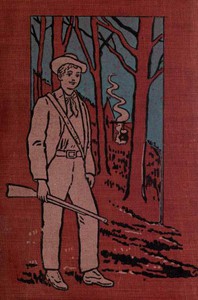Driven from Home; Or, Carl Crawford's Experience by Jr. Horatio Alger (epub ebook reader .TXT) 📗

- Author: Jr. Horatio Alger
Book online «Driven from Home; Or, Carl Crawford's Experience by Jr. Horatio Alger (epub ebook reader .TXT) 📗». Author Jr. Horatio Alger
“It seems to me, Leonard, you were born lazy,” said his uncle, sharply.
“I don’t care to work with my hands.”
“Do you care to work at all?”
“I should like to be a bookkeeper.”
“Do you know that my work is harder and more exhausting than that of a workman in the factory?”
“You don’t want to exchange with him, do you?” asked Leonard.
“No.”
“That’s where I agree with you.”
Mr. Jennings took several weekly papers. Leonard was looking over the columns of one of them one day, when he saw the advertisement of a gift enterprise of a most attractive character. The first prize was a house and grounds valued at ten thousand dollars. Following were minor prizes, among them one thousand dollars in gold.
Leonard’s fancy was captivated by the brilliant prospect of such a prize.
“Price of tickets—only one dollar!” he read. “Think of getting a thousand dollars for one! Oh, if I could only be the lucky one!”
He took out his purse, though he knew beforehand that his stock of cash consisted only of two dimes and a nickel.
“I wonder if I could borrow a dollar of that boy Carl!” he deliberated. “I’ll speak to him about it.”
This happened more than a week after Carl went to work in the factory. He had already received one week’s pay, and it remained untouched in his pocket.
Leonard joined him in the street early in the evening, and accosted him graciously.
“Where are you going?” he asked.
“Nowhere in particular. I am out for a walk.”
“So am I. Shall we walk together?”
“If you like.”
After talking on indifferent matters, Leonard said suddenly: “Oh, by the way, will you do me a favor?”
“What is it?”
“Lend me a dollar till next week.”
In former days Carl would probably have granted the favor, but he realized the value of money now that he had to earn it by steady work.
“I am afraid it won’t be convenient,” he answered.
“Does that mean that you haven’t got it?” asked Leonard.
“No, I have it, but I am expecting to use it.”
“I wouldn’t mind paying you interest for it—say twenty-five cents,” continued Leonard, who had set his heart on buying a ticket in the gift enterprise.
“I would be ashamed to take such interest as that.”
“But I have a chance of making a good deal more out of it myself.”
“In what way?”
“That is my secret.”
“Why don’t you borrow it of your uncle?”
“He would ask too many questions. However, I see that you’re a miser, and I won’t trouble you.”
He left Carl in a huff and walked hastily away. He turned into a lane little traveled, and, after walking a few rods, came suddenly upon the prostrate body of a man, whose deep, breathing showed that he was stupefied by liquor. Leonard was not likely to feel any special interest in him, but one object did attract his attention. It was a wallet which had dropped out of the man’s pocket and was lying on the grass beside him.
CHAPTER XVIII. LEONARD’S TEMPTATION.
Leonard was not a thief, but the sight of the wallet tempted him, under the circumstances. He had set his heart on buying a ticket in the gift enterprise, and knew of no way of obtaining the requisite sum—except this. It was, indeed, a little shock to him to think of appropriating money not his own; yet who would know it? The owner of the wallet was drunk, and would be quite unconscious of his loss. Besides, if he didn’t take the wallet, some one else probably would, and appropriate the entire contents. It was an insidious suggestion, and Leonard somehow persuaded himself that since the money was sure to be taken, he might as well have the benefit of it as anyone else.
So, after turning over the matter in his mind rapidly, he stooped down and picked up the wallet.
The man did not move.
Emboldened by his insensibility, Leonard cautiously opened the pocketbook, and his eyes glistened when he saw tucked away in one side, quite a thick roll of bills.
“He won’t miss one bill,” thought Leonard. “Anyone else might take the whole wallet, but I wouldn’t do that. I wonder how much money there is in the roll.”
He darted another glance at the prostrate form, but there seemed no danger of interruption. He took the roll in his hand, therefore, and a hasty scrutiny showed him that the bills ran from ones to tens. There must have been nearly a hundred dollars in all.
“Suppose I take a five,” thought Leonard, whose cupidity increased with the sight of the money. “He won’t miss it, and it will be better in my hands than if spent for whiskey.”
How specious are the arguments of those who seek an excuse for a wrong act that will put money in the purse!
“Yes, I think I may venture to take a five, and, as I might not be able to change it right away, I will take a one to send for a ticket. Then I will put the wallet back in the man’s pocket.”
So far, all went smoothly, and Leonard was proceeding to carry out his intention when, taking a precautionary look at the man on the ground, he was dumfounded by seeing his eyes wide open and fixed upon him.
Leonard flushed painfully, like a criminal detected in a crime, and returned the look of inquiry by one of dismay.
“What—you—doing?” inquired the victim of inebriety.
“I—is this your wallet, sir?” stammered Leonard.
“Course it is. What you got it for?”
“I—I saw it on the ground, and was afraid some one would find it, and rob you,” said Leonard, fluently.
“Somebody did find it,” rejoined the man, whose senses seemed coming back to him. “How much did you take?”
“I? You don’t think I would





Comments (0)